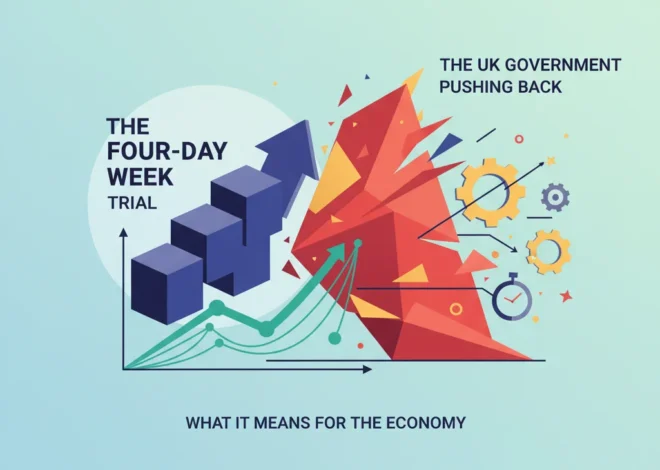
A Radical Plan to Revive the UK Stock Market: Should Your ISA Savings Be Forced into Stocks?
In the world of finance, bold ideas often spark the most intense debates. A recent proposal from one of the industry’s most prominent figures, Revolut chair and Aberdeen Asset Management founder Martin Gilbert, has done just that. His suggestion? That the government should compel savers to move their money out of cash ISAs and into the UK stock market by curbing tax-free allowances on cash. It’s a provocative idea aimed at solving a critical problem: the chronic underperformance and declining relevance of the London Stock Exchange.
This isn’t just a technical debate for City traders; it’s a proposal that could fundamentally reshape how millions of Britons save for their future. It pits the urgent need for national economic revival against the cherished principle of individual financial freedom. In this article, we will dissect Martin Gilbert’s radical plan, explore the deep-seated issues facing the UK economy that prompted it, and analyze the potential consequences for investors, savers, and the future of UK finance.
The Proposal: A “Radical” Jolt for a Stagnant Market
Speaking at a recent event, Martin Gilbert didn’t mince words. He argued that the UK’s capital markets are in dire need of a demand-side stimulus and that the vast sums of money sitting in cash ISAs represent an untapped resource. According to the Financial Times, Gilbert stated, “The government should be radical and say you can only put £10,000 into a cash Isa and £10,000 into an equity Isa.”
Currently, UK savers can place up to £20,000 annually into an ISA, choosing to allocate it freely between cash, stocks and shares, or other options. Gilbert’s proposal would effectively halve the tax-free allowance for those who prefer the safety of cash, creating a powerful—some would say coercive—incentive to embrace the risks and potential rewards of the stock market. His rationale is clear: to channel the nation’s savings into productive capital for British businesses, thereby boosting valuations, encouraging investment, and revitalizing the entire economic ecosystem.
Diagnosing the Ailment: Why is the UK Stock Market “Unloved”?
To understand the motivation behind such a drastic proposal, one must first appreciate the precarious state of the UK stock market. For years, London has been losing its lustre as a premier financial centre. This decline is not a single event but a slow erosion driven by several factors:
- The Valuation Gap: UK-listed companies often trade at a significant discount compared to their counterparts in the US and Europe. This makes it harder for them to raise capital and makes them vulnerable to foreign takeovers.
- The Pension Fund Exodus: Over the past two decades, UK pension and insurance funds have dramatically reduced their holdings in domestic equities. Regulatory changes and a shift towards less volatile assets like bonds have seen their allocation to UK shares plummet from over 50% to less than 4% (source). This has removed a foundational pillar of support for the market.
- The IPO Drain: High-profile British companies, such as the chip designer Arm, have increasingly chosen to list on overseas exchanges like the NYSE, seeking higher valuations and deeper capital pools. This starves the London market of exciting growth stories.
This combination of factors has created a negative feedback loop: low valuations deter new listings, which in turn makes the market less attractive to investors, further depressing valuations. Gilbert’s plan is a direct attempt to break this cycle by engineering a massive new source of domestic demand.
The Unexpected Globalist: Why a Conservative Worldview Can Foster Deeper International Ties
Cash vs. Stocks: Understanding the ISA Landscape
At the heart of this debate is the Individual Savings Account (ISA), the UK’s most popular tax-efficient savings vehicle. The core difference between a Cash ISA and a Stocks & Shares ISA is the trade-off between risk and potential return. For many, cash is king—it’s safe, predictable, and perfect for short-term goals. For others, investing in the stock market is the only viable path to long-term wealth creation that outpaces inflation.
The sheer scale of capital held in cash is staggering. According to the latest data from HMRC, the total value of adult ISA holdings was £742 billion at the end of the 2022-23 tax year, with a substantial portion held in cash source. It is this vast reservoir of capital that policymakers and financiers are eyeing.
To clarify the distinction for savers, here is a breakdown of the two primary ISA types:
| Feature | Cash ISA | Stocks & Shares ISA |
|---|---|---|
| Primary Goal | Safe, tax-free savings for short-to-medium term goals (e.g., house deposit, emergency fund). | Long-term growth (5+ years) that aims to outperform inflation. |
| Risk Level | Very low. Capital is protected (up to FSCS limits), but its real value can be eroded by inflation. | Medium to high. The value of investments can go down as well as up. You could get back less than you put in. |
| Potential Return | Modest returns based on prevailing interest rates. | Potentially high returns from capital gains and dividends, but not guaranteed. |
| Underlying Assets | Cash deposits held with a bank or building society. | Equities (stocks), bonds, funds, investment trusts, and other financial instruments. |
However, the counterarguments are powerful. Forcing the hands of savers, particularly those who are risk-averse or saving for near-term goals like a first home, feels fundamentally illiberal. It undermines the very concept of an “individual” savings account. Could this not lead to unintended consequences? Imagine a market downturn where novice investors, pushed into equities against their better judgment, see their life savings plummet. The political and social fallout would be immense. A more palatable solution, which is already being explored, is the “British ISA”—a “carrot” that offers an additional tax-free allowance specifically for UK investments. This encourages the desired behaviour without penalizing prudence. Gilbert’s idea has succeeded in highlighting the urgency of the problem, but a solution that respects saver choice is far more likely to succeed in the long run.
The Ripple Effect on Fintech, Banking, and the Economy
A policy shift of this magnitude would send shockwaves through the entire financial services industry. The implications extend far beyond the individual saver’s account statement.
- Banking Sector: Traditional banks, which rely on cash ISA deposits as a stable and cheap source of funding, would face significant disruption. They would need to find alternative funding sources, potentially increasing the cost of lending for mortgages and business loans.
- Fintech and Trading Platforms: Conversely, this would be a monumental boon for the financial technology sector. Platforms offering stock trading and investment management—including Gilbert’s own Revolut—would see a massive influx of new customers and assets under management. This could accelerate the ongoing shift from traditional banking to digital-first investment services.
- The Broader Economy: Proponents argue that a reinvigorated stock market would create a wealth effect, boosting confidence and spending. It would make it easier for innovative UK companies to raise capital for growth, driving job creation and technological advancement. However, critics warn it could create an artificial bubble, propped up by forced investment rather than genuine economic fundamentals.
This highlights a central tension in modern economics: how to balance free-market principles with state intervention aimed at achieving national strategic goals.
Navigating the Surge: Is Riding a Bubble Market the Only Move Left for Investors?
Are There Better Ways? Exploring Alternative Solutions
Gilbert’s proposal is not the only idea on the table. The UK government and financial industry are actively exploring other, less forceful, ways to encourage investment in British assets.
The most prominent is the “British ISA” or “UK ISA,” which would provide an additional £5,000 tax-free allowance for savers who invest specifically in UK-listed companies. This “carrot” approach incentivizes the desired behaviour without penalizing those who prefer cash. It rewards, rather than coerces, investment in the domestic economy.
Furthermore, there’s a growing consensus that a lack of financial education is a major barrier. Many people stick with cash simply because the world of investing seems complex and intimidating. Greater investment in financial literacy could empower more people to make informed decisions about moving into the stock market voluntarily. The rise of user-friendly fintech apps is already helping to democratize trading, but the knowledge gap remains a significant hurdle.
In the long term, some futurists even point to the potential of blockchain technology and asset tokenization to make investing in UK companies more seamless and accessible to a global audience, further deepening the pool of available capital.
The Chip War's New Front: Why China's Olive Branch to Europe Could Reshape Global Markets
Conclusion: A Necessary Debate for Britain’s Financial Future
Martin Gilbert’s proposal to force ISA savers into UK stocks is a lightning rod for debate, and for good reason. It is a radical solution to a genuine and pressing crisis facing the UK economy. While the methods may be unpalatable to many who value financial freedom, the proposal has successfully forced a national conversation about a critical issue: how can the UK channel its own domestic savings to fuel its future growth?
Whether the final solution is a stick, a carrot, or a combination of education and technological innovation remains to be seen. But one thing is certain: the era of passively watching capital flow out of UK equities is over. The debate Gilbert has ignited will shape the landscape of saving and investing in the UK for years to come, impacting everything from individual retirement plans to the country’s standing on the global economic stage.


